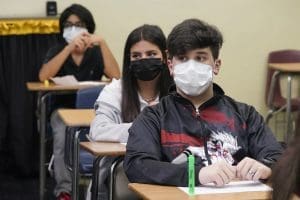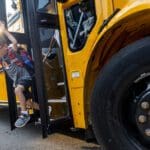Students endure attacks from adults as they push for school mask requirements
Ongoing debates about school mask mandates miss a crucial component: student input.

COVID-19 infections in children increased “exponentially” this summer, the American Academy of Pediatrics reported on Sept. 9, a finding issued as millions of students across the country return to the classroom.
Despite detailed recommendations from the Centers for Disease Control and Prevention on how to reopen safely, states and localities are implementing drastically different safety measures to prevent viral spread, resulting in a patchwork of regulations that have left parents and teachers frustrated and confused.
Caught in the middle are the students themselves. Despite being the subjects of the very policies their parents, educators, and elected officials are fighting about, students say their voices aren’t being heard in these debates.
“I think a lot of students are so frustrated that we don’t know what’s going on,” said Will Severn, a high school junior in Murfreesboro, Tennessee, who recently testified to his school board on behalf of mandatory masking. “These policies had a very real impact on us, and we feel almost disconnected from it.”
Though students were mostly spared from severe COVID infections during the onset of the pandemic, cases in young people have been rising steadily in recent months as the highly virulent delta variant continues to proliferate. Over 243,000 children tested positive for COVID-19 during the first full week of September, new Academy of Pediatrics data shows, a 240% increase in new youth COVID infections since early July.
The CDC has stressed that multiple mitigation strategies such as vaccinations, masks, distancing, and ventilation are crucial to protecting children’s safety in schools. Debates over masks continue to make the news, as arguments over trade-offs between freedom and public safety play out daily, in school board meetings and cafeteria lunch lines.
“It’s been very overwhelming to exist in this … new reality,” said Norah Laughter, a high school senior in Bowling Green, Kentucky, and member of the youth activism group Kentucky Student Voice Team.
“It’s a different kind of existence where there’s different things you have to worry about,” Laughter added. “Like the health of your friends and your classmates and your family all the time. You still don’t want to compromise that, while also being able to do all of the normal high school things.”
The science of masking is clear: Numerous peer-reviewed studies have shown that proper use of face masks significantly slows COVID-19 transmission. Moreover, a study published in June 2020 in the Proceedings of the National Academy of Sciences found that other mitigation measures like social distancing and sanitation are “insufficient by themselves in protecting the public” without “mandated face covering.”
School mask mandates are broadly popular among adults, multiple recent polls have shown; two-thirds of parents support requiring masks in the classroom, according to a recent USA Today/Ipsos poll.
Students’ opinions are harder to gauge en masse: To date no major study has explored student attitudes toward school safety measures. But in interviews, students have said they’re willing to do anything if it means being able to have a more normal school experience, and many have spoken out on behalf of masks in public forums.
Severn, the Tennessee high school student, reflected on his experience testifying to his local school board, pointing to the solidarity his fellow students showed: “Not a single one of them was against making masks mandatory, every single one of them argued for mask mandates,” he said. “That’s sending a clear, unmistakable message to educational policymakers at the local, state, and federal level that this is our position for a majority of students.”
Though they may be in the minority, anti-mask activists have become an increasingly vocal and violent presence: In recent weeks, parents have encouraged their maskless children to ignore masking guidelines in Washtenaw County, Michigan; pushed a student recording anti-masks protests in Ft. Lauderdale, Florida, into a fence; and threatened public health experts testifying in support of masks in Franklin, Tennessee.
“We know who you are. You can leave freely, but we will find you,” one protester can be heard saying in a video of the confrontation in Franklin as others chant, “No more masks.”
Grady Knox, a classmate of Severn, was heckled during a Sept. 7 school board meeting in Murfreesboro while speaking about losing his grandmother to COVID-19.
In a video of the meeting that later went viral, two unmasked women seated behind him could be seen smiling and shaking their heads as Knox spoke and stressed the importance of masks. One woman held up a sign reading “Let our kids smile.” Others in the room could be heard shouting, “No” and “Shut up.”
“To me, those actions are horrid and irredeemable,” Severn said. “I don’t care what side of the debate you’re on, would you not agree that that’s unacceptable behavior?”
Laughter recalled a similar situation unfolding when she attended a meeting of the Kentucky Administrative Regulation Review Subcommittee in August. As her peers testified in support of mandatory masking, unmasked parents in the room made a scene, all while she and her peers worked to keep their cool with their masks on.
“We sat for two hours, surrounded by adults who were screaming and clapping for all of this anti-mask mandate rhetoric,” Laughter remembered. “It was overwhelming.”
The patchwork of state-by-state COVID mitigation protocols has led to drastic variations in school outbreaks.
In San Francisco, where teachers and staff are required to be vaccinated and students must wear masks indoors, there have been no COVID outbreaks in schools since students returned to the classroom in mid-August, the city announced on Sept. 9. Officials also highlighted the fact that 90% of students ages 12-17 are fully vaccinated as key to the lack of school transmission.
In Michigan, where mask policies are determined by individual schools, campus COVID-19 outbreaks more than doubled in a week. In Wisconsin, where most districts do not require masks, pushback against the few officials who did impose mandates have resulted in resignations and staffing shakeups, meanwhile outbreaks continue to force temporary school closures.
Across the country, 10 states and the District of Columbia have adopted the CDC recommendations to require masks indoors, a Pew analysis of state records shows. Another 32 states leave the decision up to individual school districts, though some with exceptions: Tennessee, for example, requires that parents be allowed to let their children opt out of mandates.
The remaining eight states — each led by a Republican governor — ban schools from requiring masks for students. Though court challenges at the state and federal level have temporarily prohibited some states from enforcing those bans, GOP leaders are not backing down from their opposition to school masking; last week, for example, Texas Attorney General Ken Paxton sued six districts where officials require masking.
“The governor has been pretty obstinate in his position,” said Julia Longoria, who lives in San Antonio with her 8-year-old daughter Juliana.
With the help of her parents, Juliana recently joined 13 other youth plaintiffs in a lawsuit in federal court challenging Texas’ school mask ban, arguing it unfairly denies medically at-risk children equal access to education.
Juliana, who has been diagnosed with ADHD and asthma, wants to go to school but fears for her safety given her respiratory issues, her mother said. Even at her young age, she has no issue wearing a mask if it means being able to get back to the classroom.
“She understands the science, that masks keep her safe,” Longoria said. “And it doesn’t just keep her safe, but they keep other kids safe.”
Outside of testimony at school board meetings and legal action, young people have few avenues to make their voices heard. And even when they do speak out, many feel ignored.
“I think in most cases, politicians and people in power use the illusion of consulting students’ voices to kind of validate their own decisions,” Laughter said. “They don’t actually sit down to listen and heed the advice and requests from students.”
Connie Flanagan, a professor emerita in the School of Human Ecology at the University of Wisconsin-Madison who’s studied youth civic and political engagement, says that’s nothing new.
“There’s a tendency to dismiss people who don’t vote,” Flanagan said. “It’s easy to dismiss people whose voices don’t count in that way. … Adults get used to the way things are, and power relationships are hard to give up.”
But students haven’t been deterred in their efforts to influence the policies that govern their lives.
Since the school board heckling incident went viral, Knox has made appearances on local Tennessee news, MSNBC, and CNN, where he was joined by his classmate Severn.
And amid the media scrutiny, the Rutherford County School Board ultimately voted to mandate masks through Oct. 13, after which the policy is set to be reviewed. In accordance with Tennessee Gov. Bill Lee’s executive order in mid-August, parents are still allowed to opt their children out of wearing masks.
“We never went there with the expectation of getting media attention. That was never our plan,” Severn said of his initial testimony.
Still, he drew a lesson from his experience for other youth hoping to affect change in their communities.
“You are given a voice for reason,” Severn said. “Use it, because if you speak honestly, thoughtfully, and are informed, people will listen to you.”
Published with permission of The American Independent Foundation.
Recommended

Alaska House committee advances, expands proposal to bar trans girls from girls sports
Amended bill would add elementary, middle school and collegiate sports to limits in place for high school
By Claire Stremple, Alaska Beacon - April 16, 2024
Senate clears gallery, passes bill to arm Tennessee teachers
Covenant parents emotional in wake of vote
By Sam Stockard, Tennessee Lookout - April 10, 2024
Not if, but when: Parents of slain Parkland students urge Utah lawmakers to pass school safety bill
The parents of children killed in the 2018 Marjory Stoneman Douglas High School shooting have a stark warning for Utah lawmakers: “It’s not a matter of if, it’s a matter of when and where the next school shooting will happen.”
By Kyle Dunphey, Utah News Dispatch - February 21, 2024









































































